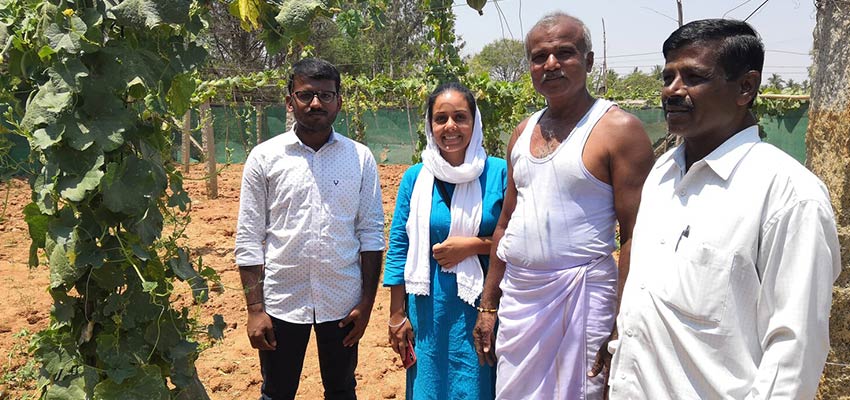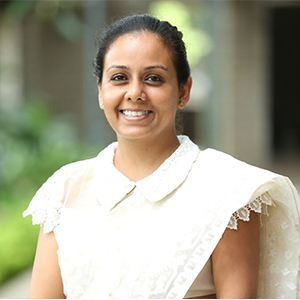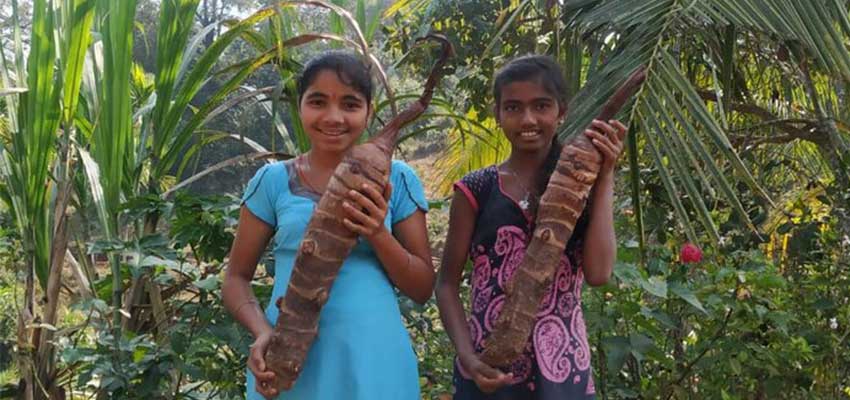
Original blog post on Upaya Social Ventures website.
Sumeet Kaur is a 2021 Scale-Ups Accelerator Fellow. The Scale-Ups Accelerator is an initiative created by Upaya Social Ventures and MIT D-Lab to increase capital flows to women entrepreneurs in India. Below is her interview with Upaya's Marketing and Communications Manager Heather Targosz
Sumeet Kaur started her career as a lawyer with a tax-advising firm. Today, however, she is a farmer and the founder of Spudnik Farms, a subscription-based farm-to-table startup headquartered in Bangalore.

Always having dreamt of running her own farm someday, Sumeet finally took the plunge into entrepreneurship when she was offered a vacant plot of land to experiment with. Soon, she was producing and selling crops to 25 local customers and built a subscription model to better manage the supply-and-demand struggles faced by many smallholder farmers.
When she realized her business could be financially sustainable, she wondered if other farmers could benefit from the same subscription-based model. That’s how Sumeet began working with marginalized farmers, and why she has dedicated her business, Spudnik Farms, to creating livelihood opportunities for farmers in the tribal region of Dandeli.
Today, Sumeet is on a mission to create an equitable and sustainable food system in which smallholding farms are profitable and farmers are prosperous. She is one of nine impact-driven women entrepreneurs participating in the 2021 Scale-Ups Accelerator, run by Upaya and MIT D-Lab. We’re so pleased to share the inspiring conversation we had with Sumeet in which we asked her about what motivated to start her business and learned about the incredible impact she has had so far.
What inspired you to start your business?
I think a lot of that was driven by how I was brought up. A lot of family holidays were centered around travel to farms and to the village where my father’s side of the family is from in Punjab. There was a lot of exploring nature and animals. So, although my education and job before this were non-agricultural, I always had this dream of having my own farm where I could grow my own food.
Was there any specific moment that made you take the jump into entrepreneurship?
I just got a little lucky. A friend's father had some extra land that was vacant, and they said, “ok, you want to try agriculture, do experiments on this land, and see where you go from here.” Because this opportunity just came along, and I’m always opportunistic in that way, I knew I wanted to try this. There was this free land, and I could do whatever I wanted on it. Why not give it a shot?
So that's really where it all began. I started growing crops for myself, and before I knew it, I had more than I needed. So I decided to start selling the extra to friends and people in the neighborhood. I realized that I really like the actual process of farming itself. It is very calming and something that I really enjoyed doing. That’s when I decided to see how I could make this financially sustainable so that I can continue doing what I like to do.

Why did you decide to focus your business on creating social impact?
Around the time I was getting my business started, there were a lot of stories in the papers about farmers and their struggles. There were times that I was thankful that my livelihood didn’t solely depend on farming—that if I needed to, I could do something else to earn a livelihood.
So when I saw that my subscription model was helping me overcome a lot of problems and challenges that I experienced as a farmer, I thought, why not use this model for the benefit of more farmers? Why not see if we could give the same kind of livelihood opportunities to more smallholder farmers? So that’s how everything came into place and why we now always focus on smallholder farmers.
What is the core problem that you are looking to solve?
The crux of it is to make smallholding farms profitable, and to make the farmers prosperous. Farming is a heavily risky proposition. The farmer is taking the risk because there are so many things that can go wrong. The out-of-season rain can destroy your crops. Or no rain can destroy your crops. To make farming profitable, we need to make interventions where we can and reduce those risks for farmers as much as we can.
This is why we do subscriptions. Because through subscriptions, we can tell our farmers they have a guaranteed market for their produce and we can tell them the quantity of each crop that they need to produce. It’s a big pressure taken off the farmer, because when they sow the crop, they know someone is going to pick up their produce and there is an assured market for their produce.
How does your business improve the farmers’ livelihoods?
Pricing of crops is very inequitable because, although farmers bear most risk in the supply chain, they get the least amount of reward for taking that risk. So we do farmgate procurement from farmers to offer them a better, transparent price because we cut away all the middle men in the chain.
In addition, most of our farmers grow anywhere from five to 20 different crops on the same piece of land. So it’s very intensive agriculture, but it ensures that the farmer has something to give every week. Instead of waiting for an entire season before the farmers reap benefits from the sale of crops, they get money every week, so there is better cashflow. The intention is that all our farmers should be earning monthly income instead of seasonal revenue that is typically associated with agriculture.
The other focus is on using low-cost production methods so that the farmer gets higher profits. So we give farmers training in making compost, in using naturally available resources to create pesticides on their farm. That gives farmers better solutions to managing disease and pests, and the cost of production goes down, so their profit margin increases.
In terms of making farming profitable for farmers, how do you define that?
In terms of numbers, our goal is to get each farmer to earn INR 50,000/month from each acre of land that they hold.
Numbers aside, we view prosperity for farmers as when they start looking at longer term goals. When farmers can move away from this hand-to-mouth existence, they can actually start planning for what they want to do for their children and thinking through how much they need to set aside for children’s education or to build a better house. Those are the kinds of things that reflect the transformation that we’re able to make in their lives.
What keeps you up at night?
The farmers that we work with belong to the Kunbi tribe. They are indignous to the Western Ghats area. They are the ancestral landholders of the area. A long time ago, all the other communities used to rely on them for rice and tubers. But over the years, because they were so connected to their lands, they got left behind. The other communities migrated to cities and started earning more income. So though they were literally the landholders and very well respected, the current generation finds themselves in a place where they are the marginalized community.
What keeps me up at night is thinking about how I can make a positive change for these farmers as quickly as we can. I would feel I have accomplished something through the interventions of Spudnik Farms when we are able to lift most of these tribal people out of poverty and really make them feel proud about their heritage—if we can show them how their indignous methods of agriculture can be used to lift themselves out of the poverty they face today.
Have you faced any challenges in building relationships with the farmers?
The challenge with the farmers has been earning their trust and making them see that we will be there to work with them in the long run. There are many people who come to them with one-off CSR initiatives, and do not stick around. Apart from building a local team, I visit the farmers once a month, because if they see me face-to-face, it makes a lot of difference in how they view our organisation.
What has been your biggest personal takeaway in the entrepreneurial journey?
I never thought I would be an entrepreneur. Only when I started down this path and challenged myself did I realise my true potential. So the biggest teakway for me is to constantly challenge myself, challenge my abilities, and see what more I can do.
Was there any specific moment that you thought you could fail, and how did you power through?
It happens on a very regular basis. I’m the kind of person who always expects things to go wrong and who always has a plan a, plan b, plan c. I’m always trying to prepare and make sure that, if a disaster happens, I have a plan to at least work with things within my control.
What advice would you give to other aspiring entrepreneurs?
The one thing that has always helped me is, whenever there is a doubt in your mind about a particular business decision, always go back to your customers. Your customers will always tell you what your business needs. We follow that very rigidly. Any new product that we launch, we always first go to our customers.
What continues to motivate you to do this every day?
I think my motivation is always the farmers. For a long time this was all a dream, and I didn't know if it was possible, but when you see the impact actually being created in front of your eyes, it is a very big motivating factor.
For example, the first farmer we worked with in 2018—she lived in a “katcha” house (a house made of mud, straw, or wood). It was really run down. Within two years of working with us, she has managed to make a “pucca” house (a house made of cement, bricks, or steel).
It fills me with so much happiness and pride that we made a difference to this one person’s life. Now that I know it is possible to do it, I want to go and make the same kind of difference for a hundred others.More information
More Information
MIT D-Lab Scale-Ups Fellowship
Contact
Jona Repishti, MIT D-Lab Social Entrepreneurship Manager

